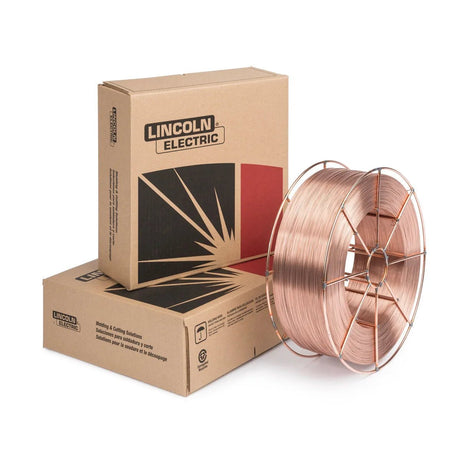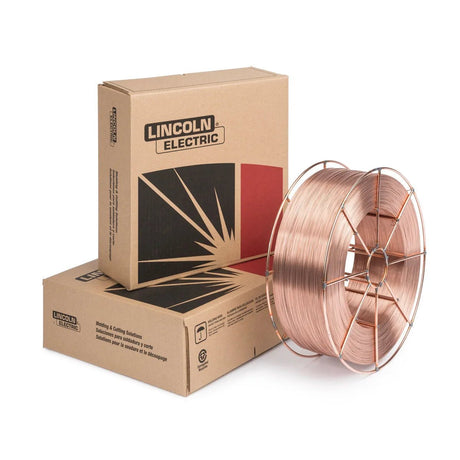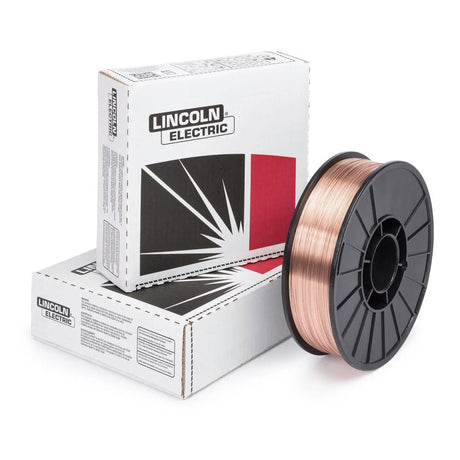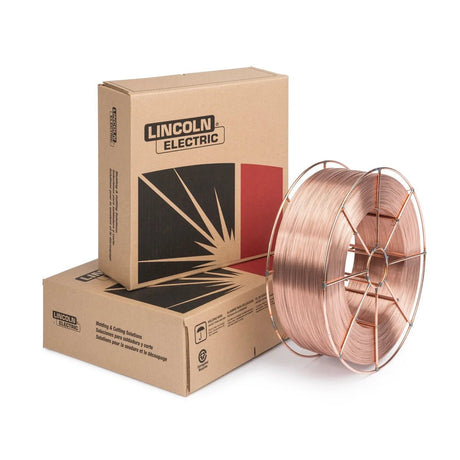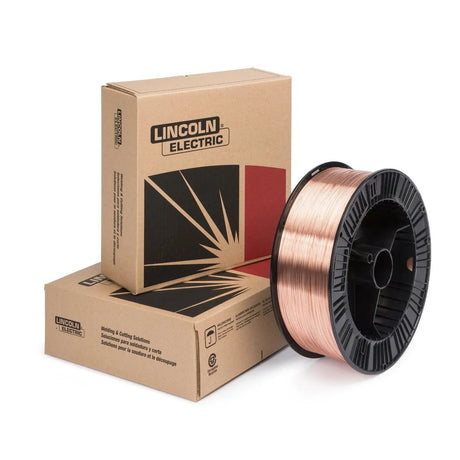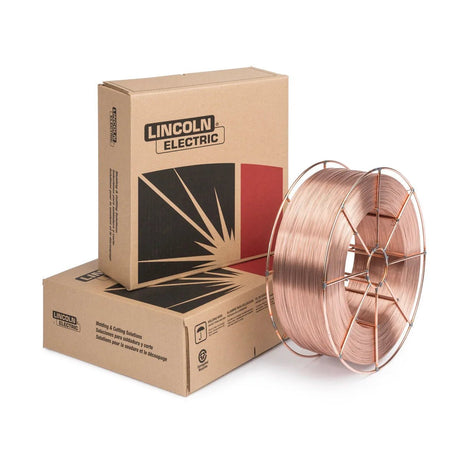Shop MIG, flux-cored, aluminum, and steel welding wires for clean, strong welds. Perfect for automotive, fabrication, and construction projects.
Lincoln ED028676 SuperArc L-56 MIG GMAW Mild Steel Welding Wire, 0.035 in, 12.5 lb Spools
$54.34$77.38Unit price /UnavailableLincoln ED031415 SuperArc LA-75 MIG GMAW Mild Steel Welding Wire, 0.035 in, 33 lb Spool
$258.15$274.56Unit price /UnavailableLincoln ED025945 SuperArc L-56 MIG GMAW Mild Steel Welding Wire, 0.035 in, 44 lb Steel Spool
$219.13$261.36Unit price /UnavailableLincoln ED032927 SuperArc L-56 MIG GMAW Mild Steel Welding Wire, 0.035 in, 33 lb Plastic Spool
$170.62$202.95Unit price /UnavailableLincoln ED023334 SuperArc L-56 MIG GMAW Mild Steel Welding Wire, 0.030 in, 12.5 lb Spool
$67.14$79.50Unit price /UnavailableLincoln ED031408 SuperArc L-50 MIG GMAW Mild Steel Welding Wire, 0.035 in, 33 lb Spool
$161.38$192.39Unit price /UnavailableLincoln ED021276 SuperArc L-56 MIG GMAW Mild Steel Welding Wire, 0.045 in, 44 lb Fiber Spool
$228.37$256.08Unit price /UnavailableLincoln ED030583 SuperArc L-56 MIG GMAW Mild Steel Welding Wire, 0.025 in, 5 2 lb Plastic Spools
$56.93$74.30Unit price /UnavailableLincoln ED015790 SuperArc L-56 MIG GMAW Mild Steel Welding Wire, 0.025 in, 12.5 lb Spool
$65.01$83.25Unit price /UnavailableLincoln ED032926 SuperArc L-56 MIG GMAW Mild Steel Welding Wire, 0.030 in, 33 lb Plastic Spool
$182.50$216.15Unit price /UnavailableLincoln ED030632 SuperArc L-56 MIG GMAW Mild Steel Welding Wire, 0.035 in, 5 2 lb Plastic Spools
$65.71$66.60Unit price /UnavailableLincoln ED031411 SuperArc L-56 MIG GMAW Mild Steel Welding Wire, 0.035 in, 33 lb Steel Spool
$166.99$198.66Unit price /UnavailableLincoln ED032366 SuperArc L-59 MIG GMAW Mild Steel Welding Wire, 0.035 in, 44 lb Spool
$243.24$264.88Unit price /UnavailableLincoln ED032924 SuperArc L-50 MIG GMAW Mild Steel Welding Wire, 0.035 in, 33 lb Spool
$177.51$193.71Unit price /UnavailableLincoln ED031417 SuperArc LA-100 MIG GMAW Mild Steel Welding Wire, 0.045 in, 33 lb Spool
$348.13$423.06Unit price /UnavailableHarris ER70S-6 Mild Steel MIG Welding Wire .035 33# SPOOL - E70S6F8
$68.39$95.70Unit price /UnavailableLincoln ED031414 SuperArc LA-90 MIG GMAW Mild Steel Welding Wire, 0.045 in, 33 lb Spool
$238.27$266.31Unit price /UnavailableLincoln ED032928 SuperArc L-56 MIG GMAW Mild Steel Welding Wire, 0.045 in, 33 lb Plastic Spool
$178.50$195.03Unit price /UnavailableLincoln ED032367 SuperArc L-59 MIG GMAW Mild Steel Welding Wire, 0.045 in, 44 lb Spool
$238.65$260.48Unit price /UnavailableLincoln ED029042 SuperArc L-56 MIG GMAW Mild Steel Welding Wire, 0.045 in, 12.5 lb Spool
$75.51$76.13Unit price /UnavailableLincoln ED029546 SuperArc LA-90 MIG GMAW Mild Steel Welding Wire, 0.035 in, 44 lb Spool
$375.67$398.20Unit price /UnavailableLincoln ED021278 SuperArc L-56 MIG GMAW Mild Steel Welding Wire, 0.052 in, 44 lb Fiber Spool
$226.17$253.88Unit price /UnavailableLincoln eds30779 superarc la-100 mig gmaw mild steel welding wire, 0.045 in, 44 lb spool
$450.41$550.88Unit price /UnavailableLincoln EDS30776 SuperArc LA-90 MIG GMAW Mild Steel Welding Wire, 0.045 in, 44 lb Spool
$315.35$337.04Unit price /UnavailableLincoln ED034271 SuperArc L-59 MIG GMAW Mild Steel Welding Wire, 0.045 in, 33 lb Spool
$182.43$198.66Unit price /UnavailableLincoln ED032923 SuperArc L-50 MIG GMAW Mild Steel Welding Wire, 0.030 in, 33 lb Spool
$206.92$229.68Unit price /UnavailableLincoln ED033703 SuperArc L-56 MIG GMAW Mild Steel Welding Wire, 0.045 in, 44 lb Spool
$245.20$266.64Unit price /UnavailableLincoln ED033033 SuperArc L-59 MIG GMAW Mild Steel Welding Wire, 0.035 in, 44 lb Spool
$245.20$266.64Unit price /UnavailableLincoln ED025946 SuperArc L-56 MIG GMAW Mild Steel Welding Wire, 0.045 in, 44 lb Steel Spool
$232.09$253.88Unit price /UnavailableLincoln ED031416 SuperArc LA-75 MIG GMAW Mild Steel Welding Wire, 0.045 in, 33 lb Spool
$250.78$266.97Unit price /UnavailableLincoln ED031413 SuperArc LA-90 MIG GMAW Mild Steel Welding Wire, 0.035 in, 33 lb Spool
$242.89$271.59Unit price /UnavailableLincoln ED031407 SuperArc L-50 MIG GMAW Mild Steel Welding Wire, 0.030 in, 33 lb Spool
$201.64$228.36Unit price /Unavailable- $5,140.51
$5,630.00Unit price /Unavailable Lincoln ED030631 SuperArc L-56 MIG GMAW Mild Steel Welding Wire, 0.030 in, 5 2 lb Plastic Spools
$55.44$70.30Unit price /UnavailableLincoln EDS30778 SuperArc LA-100 MIG GMAW Mild Steel Welding Wire, 0.035 in, 44 lb Spool
$559.94$622.16Unit price /UnavailableLincoln ED034270 SuperArc L-59 MIG GMAW Mild Steel Welding Wire, 0.035 in, 33 lb Spool
$176.23$200.97Unit price /UnavailableLincoln ED033949 SuperArc LA-75 MIG GMAW Mild Steel Welding Wire, 0.035 in, 33 lb Spool
$288.15$325.38Unit price /UnavailableLincoln ED032865 SuperArc L-59 MIG GMAW Mild Steel Welding Wire, 1/16 in, 1000 lb Accu-Pak Box
$5,274.61$5,770.00Unit price /UnavailableHarris ER70S-6 Mild Steel MIG Welding Wire .030 33# SPOOL - E70S6E8
$111.94$129.36Unit price /UnavailableLincoln ED031412 SuperArc L-56 MIG GMAW Mild Steel Welding Wire, 0.045 in, 33 lb Steel Spool
$171.94$192.72Unit price /UnavailableLincoln ED021270 SuperArc L-50 MIG GMAW Mild Steel Welding Wire, 0.045 in, 44 lb Spool
$228.81$250.36Unit price /UnavailableLincoln ED021268 SuperArc L-50 MIG GMAW Mild Steel Welding Wire, 0.035 in, 44 lb Spool
$215.61$256.52Unit price /UnavailableLincoln ED037362 SuperArc LA-90 MIG GMAW Mild Steel Welding Wire, 1/16 in, 60 lb Spool
$441.72$490.80Unit price /UnavailableLincoln ED037356 SuperArc L-56 MIG GMAW Mild Steel Welding Wire, 1/16 in, 60 lb Fiber Spool
$337.05$366.60Unit price /UnavailableLincoln ED037006 SuperArc L-52 MIG GMAW Mild Steel Welding Wire, 0.045 in, 44 lb Spool
$26,943.84$29,937.60Unit price /UnavailableLincoln ED036879 SuperArc L-50 MIG GMAW Mild Steel Welding Wire, 0.045 in, 33 lb Spool
$173.45$192.72Unit price /UnavailableLincoln ED034894 SuperArc AK-10 MIG GMAW Mild Steel Welding Wire, 0.035 in, 33 lb Spool
$610.21$673.53Unit price /UnavailableLincoln EDS01372 SuperArc LA-90 MIG GMAW Mild Steel Welding Wire, 0.035 in, 500 lb Accu-Trak Drum
$3,739.91$3,985.00Unit price /UnavailableLincoln ED032968 SuperArc L-59 MIG GMAW Mild Steel Welding Wire, 1/16 in, 44 lb Spool
$231.44$253.00Unit price /UnavailableLincoln ED032925 SuperArc L-50 MIG GMAW Mild Steel Welding Wire, 0.045 in, 33 lb Spool
$167.98$189.09Unit price /Unavailable
The Ultimate Guide to Welding Wires: MIG Wire, Welder Wire, and More
Introduction to Welding Wires
Overview of Welding Wire Types
Welding wires are essential consumables in various welding processes, serving as the filler material that melts and fuses with the base metal. They are available in different types, including welding wire mild steel and carbon steel. These wires come in materials like carbon steel, stainless steel, and aluminum, each offering specific benefits. Lincoln products often feature these materials. Types of welding wires include solid wires used in MIG (Metal Inert Gas) welding, flux-cored wires suited for different environments, and specialty wires like those designed for aluminum or stainless steel. Lincoln offers a comprehensive range of these options. Alloys play a critical role in determining the characteristics of welding wires, influencing factors such as corrosion resistance and strength. For welders, DIY enthusiasts, and professionals, understanding the specific characteristics of each welding wire type is crucial for achieving optimal results. For instance, Lincoln solid wire options are renowned for their consistent performance. The best wires provide high resistance to spatter, are easy to work with, and offer solid welding qualities, regardless of the welding process being used.
Importance of Selecting the Correct Wire
This involves understanding the various attributes of MIG welding wire and other options. Choosing the right welding wire directly impacts weld strength, appearance, and overall project success. Factors such as base metal, welding position, and the environment influence which wire is most suitable for the work at hand, especially in projects involving arc welding or general fabrication. The right selection ensures safety, reduces rework, and provides a better finish, making it a vital consideration for industries from automotive repair to large structural construction.
Types of Welding Wires
MIG Welding Wire
MIG welding wire, also known as welder wire or weld wire, comes in solid spools and is used alongside a shielding gas to protect the weld from contamination while delivering an excellent finish. Lincoln MIG welding wire is known for its superior quality. The most common materials are mild steel, stainless steel, and aluminum. This wide range offers flexibility for different project specifications. MIG wire is favored for its clean finish and ease of use, making it ideal for both professional and hobbyist projects, including Mild Steel MIG and Aluminum MIG welding. Some popular sizes include ER70S-6 for steel and ER4043 for aluminum applications, with options available in different spool weights such as 2 lb for smaller projects. MIG Welding Wire selection depends on factors like diameter and alloy.
Flux-Cored Welding Wire
These wires come in a variety of alloys, offering protection against elements, especially in outdoor applications. Flux-cored welding wire, also called tubular welding wire, features a hollow center filled with flux that shields the weld pool from contaminants. Its popularity in the industry is partly due to Lincoln's innovations in this area. This type of wire is especially useful for outdoor or high-production welding where a shielding gas may not be practical. Another Lincoln innovation is their E71T GS type, recognized for its ease of use. The structural integrity provided by these wires is crucial for ensuring safety in high-stress environments. Their expertise in alloy blends ensures consistent results. Flux-cored wires excel in welding thicker materials, making them common in construction and heavy fabrication. The E71T GS type is favored for its low spatter and ease of use. Lincoln's advanced electrode and spool technology support superior weld quality. Choices range from self-shielded to gas-shielded variants, each suitable for different scenarios. Each provides distinct advantages based on the project's demands.
Aluminum and Steel Options
For example, Lincoln's focus on innovation has led to cutting-edge solutions in both Aluminum MIG and Steel MIG Welding. Welding wires are available in a range of materials to match the base metals being joined. Copper-coated welding wires are frequently chosen for their enhanced conductivity and corrosion resistance, contributing to their reliability in demanding applications. Aluminum welding wire is prized for its lightweight and anti-corrosive properties, used extensively in automotive and aerospace industries. Steel welding wire, both stainless and carbon steel, is the workhorse of construction and manufacturing, often found in Lincoln Electric products. This includes solid wire and flux options. Selecting the right material ensures compatibility, strength, and durability in the finished weld.
Factors to Consider When Choosing Welding Wires
Material Compatibility
Ensuring that your welding wire matches the base metal is essential for strong, defect-free welds. Lincoln's products, including their solid MIG wires, guarantee compatibility with various materials. This is critical for procedures involving both TIG and ARC welding methods. Using a steel wire on aluminum, for example, can result in weak bonds and increased risk of corrosion. Using copper-coated wires can also enhance the durability and lifespan of the weld. Check wire labels and manufacturer guidelines to confirm compatibility with your project’s materials. Lincoln's E71T GS variant, with its easy application process, ensures user success.
Project Requirements
Project scale, environmental conditions, and required weld quality all influence wire selection. This means considering aspects like Lincoln's lb spool offerings which cater to varied project sizes. For precision welds on thin materials, solid MIG wire is often best, providing low spatter and high quality. Choices like Lincoln's ER70S-6 deliver reliable results. For heavy-gauge steel or outdoor jobs, a flux-cored option may offer superior results. Lincoln's range includes products designed for all types of welding environments, ensuring optimal performance. Always consider the demands of your specific application—including joint type and thickness—when making your choice.
Welding Positions
Certain welding wires perform better in specific positions, such as flat, vertical, or overhead welding. Choosing the right diameter of the wire is essential for ensuring optimal weld penetration and bead profile. Lincoln's electrode and spool options help achieve precision. For instance, some flux-cored wires are specifically designed to allow for easier overhead or vertical-up welding, reducing the risk of defects like slag inclusions. Lincoln's E71T technology minimizes defects, enhancing weld integrity.
Quality and Performance of Welding Wires
Top Brands and Products
The welding market features a range of reputable brands offering high-quality MIG and flux-cored wires. Lincoln stands out for its wide selection, including Steel MIG Welding options. Notable manufacturers include Lincoln Electric, Hobart, and ESAB, all providing a wide selection of welding wires, including MIG and flux-cored options. Their solid wire and electrode products are highly regarded. These brands offer wires tailored for both entry-level units and professional-grade machines. These companies also offer welding accessories, providing a comprehensive supply solution for welding needs. This includes spool and electrode options from Lincoln.
User Reviews and Endorsements
Their item selection regularly tops industry reviews. User feedback consistently highlights the importance of wire quality in achieving consistent, clean welds with minimal spatter. Through Lincoln's free resources, users can find detailed product information and reviews online. Professional welders often recommend sticking with recognized brands, including Lincoln, and consulting online reviews or forums to identify products that best fit their particular setups and workflows. By involving customers in the review process, manufacturers can continue to produce premium content for their product lines, meeting the diverse needs of their clientele. Lincoln's commitment to quality ensures that each purchase aligns with professional standards.
Applications of Welding Wires
Lincoln recognizes the broad applications of welding, shaping industries with innovative products.
Industries That Rely on Welding
Welding wires are indispensable across numerous industries, including automotive repair, shipbuilding, construction, aerospace, and manufacturing. From Lincoln's ARC welding rods to other high-demand items, industry reliance on premium materials is clear. For instance, in the aerospace sector, lightweight Aluminum MIG Welding wires make them a popular choice for aircraft parts. Lincoln offers options that excel in such applications. Each field has specific requirements—such as strength, corrosion resistance, or weight—that dictate the choice of welding wire. Lincoln's products offer solutions for diverse industry challenges.
Case Studies and Examples
For example, automotive body shops often choose thin-gauge MIG wires for smooth, cosmetic welds on car panels, while heavy equipment fabrication shops rely on flux-cored wires for durable, deep-penetrating welds on thick steel plates. Such examples emphasize the importance of content that guides customers in making informed welding wire purchases, including Lincoln's varied offerings. These real-world applications underline the importance of selecting the correct welding wire for the task at hand.
Selecting the right welding wire—whether it's MIG wire, flux-cored, aluminum, or steel—plays a critical role in welding success. Lincoln's wide array of options, including E71T GS and E71T, caters to diverse needs. By understanding wire types, industry applications, and quality distinctions, welders at every level can ensure strong, clean, and reliable welds for a wide variety of projects.
The Ultimate Guide to Welding Wires: MIG Wire, Welder Wire, and More
Introduction to Welding Wires
Overview of Welding Wire Types
Welding wires are essential consumables in various welding processes, serving as the filler material that melts and fuses with the base metal. They are available in different types, including welding wire mild steel and carbon steel. These wires come in materials like carbon steel, stainless steel, and aluminum, each offering specific benefits. Lincoln products often feature these materials. Types of welding wires include solid wires used in MIG (Metal Inert Gas) welding, flux-cored wires suited for different environments, and specialty wires like those designed for aluminum or stainless steel. Lincoln offers a comprehensive range of these options. Alloys play a critical role in determining the characteristics of welding wires, influencing factors such as corrosion resistance and strength. For welders, DIY enthusiasts, and professionals, understanding the specific characteristics of each welding wire type is crucial for achieving optimal results. For instance, Lincoln solid wire options are renowned for their consistent performance. The best wires provide high resistance to spatter, are easy to work with, and offer solid welding qualities, regardless of the welding process being used.
Importance of Selecting the Correct Wire
This involves understanding the various attributes of MIG welding wire and other options. Choosing the right welding wire directly impacts weld strength, appearance, and overall project success. Factors such as base metal, welding position, and the environment influence which wire is most suitable for the work at hand, especially in projects involving arc welding or general fabrication. The right selection ensures safety, reduces rework, and provides a better finish, making it a vital consideration for industries from automotive repair to large structural construction.
Types of Welding Wires
MIG Welding Wire
MIG welding wire, also known as welder wire or weld wire, comes in solid spools and is used alongside a shielding gas to protect the weld from contamination while delivering an excellent finish. Lincoln MIG welding wire is known for its superior quality. The most common materials are mild steel, stainless steel, and aluminum. This wide range offers flexibility for different project specifications. MIG wire is favored for its clean finish and ease of use, making it ideal for both professional and hobbyist projects, including Mild Steel MIG and Aluminum MIG welding. Some popular sizes include ER70S-6 for steel and ER4043 for aluminum applications, with options available in different spool weights such as 2 lb for smaller projects. MIG Welding Wire selection depends on factors like diameter and alloy.
Flux-Cored Welding Wire
These wires come in a variety of alloys, offering protection against elements, especially in outdoor applications. Flux-cored welding wire, also called tubular welding wire, features a hollow center filled with flux that shields the weld pool from contaminants. Its popularity in the industry is partly due to Lincoln's innovations in this area. This type of wire is especially useful for outdoor or high-production welding where a shielding gas may not be practical. Another Lincoln innovation is their E71T GS type, recognized for its ease of use. The structural integrity provided by these wires is crucial for ensuring safety in high-stress environments. Their expertise in alloy blends ensures consistent results. Flux-cored wires excel in welding thicker materials, making them common in construction and heavy fabrication. The E71T GS type is favored for its low spatter and ease of use. Lincoln's advanced electrode and spool technology support superior weld quality. Choices range from self-shielded to gas-shielded variants, each suitable for different scenarios. Each provides distinct advantages based on the project's demands.
Aluminum and Steel Options
For example, Lincoln's focus on innovation has led to cutting-edge solutions in both Aluminum MIG and Steel MIG Welding. Welding wires are available in a range of materials to match the base metals being joined. Copper-coated welding wires are frequently chosen for their enhanced conductivity and corrosion resistance, contributing to their reliability in demanding applications. Aluminum welding wire is prized for its lightweight and anti-corrosive properties, used extensively in automotive and aerospace industries. Steel welding wire, both stainless and carbon steel, is the workhorse of construction and manufacturing, often found in Lincoln Electric products. This includes solid wire and flux options. Selecting the right material ensures compatibility, strength, and durability in the finished weld.
Factors to Consider When Choosing Welding Wires
Material Compatibility
Ensuring that your welding wire matches the base metal is essential for strong, defect-free welds. Lincoln's products, including their solid MIG wires, guarantee compatibility with various materials. This is critical for procedures involving both TIG and ARC welding methods. Using a steel wire on aluminum, for example, can result in weak bonds and increased risk of corrosion. Using copper-coated wires can also enhance the durability and lifespan of the weld. Check wire labels and manufacturer guidelines to confirm compatibility with your project’s materials. Lincoln's E71T GS variant, with its easy application process, ensures user success.
Project Requirements
Project scale, environmental conditions, and required weld quality all influence wire selection. This means considering aspects like Lincoln's lb spool offerings which cater to varied project sizes. For precision welds on thin materials, solid MIG wire is often best, providing low spatter and high quality. Choices like Lincoln's ER70S-6 deliver reliable results. For heavy-gauge steel or outdoor jobs, a flux-cored option may offer superior results. Lincoln's range includes products designed for all types of welding environments, ensuring optimal performance. Always consider the demands of your specific application—including joint type and thickness—when making your choice.
Welding Positions
Certain welding wires perform better in specific positions, such as flat, vertical, or overhead welding. Choosing the right diameter of the wire is essential for ensuring optimal weld penetration and bead profile. Lincoln's electrode and spool options help achieve precision. For instance, some flux-cored wires are specifically designed to allow for easier overhead or vertical-up welding, reducing the risk of defects like slag inclusions. Lincoln's E71T technology minimizes defects, enhancing weld integrity.
Quality and Performance of Welding Wires
Top Brands and Products
The welding market features a range of reputable brands offering high-quality MIG and flux-cored wires. Lincoln stands out for its wide selection, including Steel MIG Welding options. Notable manufacturers include Lincoln Electric, Hobart, and ESAB, all providing a wide selection of welding wires, including MIG and flux-cored options. Their solid wire and electrode products are highly regarded. These brands offer wires tailored for both entry-level units and professional-grade machines. These companies also offer welding accessories, providing a comprehensive supply solution for welding needs. This includes spool and electrode options from Lincoln.
User Reviews and Endorsements
Their item selection regularly tops industry reviews. User feedback consistently highlights the importance of wire quality in achieving consistent, clean welds with minimal spatter. Through Lincoln's free resources, users can find detailed product information and reviews online. Professional welders often recommend sticking with recognized brands, including Lincoln, and consulting online reviews or forums to identify products that best fit their particular setups and workflows. By involving customers in the review process, manufacturers can continue to produce premium content for their product lines, meeting the diverse needs of their clientele. Lincoln's commitment to quality ensures that each purchase aligns with professional standards.
Applications of Welding Wires
Lincoln recognizes the broad applications of welding, shaping industries with innovative products.
Industries That Rely on Welding
Welding wires are indispensable across numerous industries, including automotive repair, shipbuilding, construction, aerospace, and manufacturing. From Lincoln's ARC welding rods to other high-demand items, industry reliance on premium materials is clear. For instance, in the aerospace sector, lightweight Aluminum MIG Welding wires make them a popular choice for aircraft parts. Lincoln offers options that excel in such applications. Each field has specific requirements—such as strength, corrosion resistance, or weight—that dictate the choice of welding wire. Lincoln's products offer solutions for diverse industry challenges.
Case Studies and Examples
For example, automotive body shops often choose thin-gauge MIG wires for smooth, cosmetic welds on car panels, while heavy equipment fabrication shops rely on flux-cored wires for durable, deep-penetrating welds on thick steel plates. Such examples emphasize the importance of content that guides customers in making informed welding wire purchases, including Lincoln's varied offerings. These real-world applications underline the importance of selecting the correct welding wire for the task at hand.
Selecting the right welding wire—whether it's MIG wire, flux-cored, aluminum, or steel—plays a critical role in welding success. Lincoln's wide array of options, including E71T GS and E71T, caters to diverse needs. By understanding wire types, industry applications, and quality distinctions, welders at every level can ensure strong, clean, and reliable welds for a wide variety of projects.


